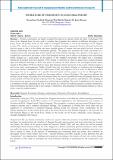| dc.contributor.author | Nyambane Fredrick Monanti, Kitche Magak, Jane Bwonya | |
| dc.date.accessioned | 2022-01-24T09:37:11Z | |
| dc.date.available | 2022-01-24T09:37:11Z | |
| dc.date.issued | 2019 | |
| dc.identifier.issn | 2582-0265 | |
| dc.identifier.uri | https://repository.maseno.ac.ke/handle/123456789/4620 | |
| dc.description | www.ijmsssr.org | en_US |
| dc.description.abstract | – Human communities are largely socialized through art to operate within the limits of ideologies. The form of art Abagusii have for eons used to socialize their populace into subjects of different ideologies is oral poetry hence, the perfect choice by this study to investigate femininity as one of the ideologies in the Abagusii cosmos. Th e choice of oral poetry as a vehicle for studying femininity among the Gusii is informed by the fact that this genre is that it is the oldest and most versatile genres of orature and one which has had a long and intimate relationship with human communities globally. This paper thus examines the Gusii oral poems as a semiotic system with encoded signs which embody the Gusii feminine ideology. The objective of the paper is to establish the construction and nature of the Gusii feminine ideology and its efficacy in shaping social relationships within Abagusii as a social entity. In the analysis of the sampled oral poems, this paper uses a conceptual framework developed from the Chandler (1995) strands of semiotics in which he argues that a culture produces signs and attributes meanings to them. The tenets of semiosis are then linked to the sociological literary theory strands by Rosenblatt (1978) in which he argues that literature mirrors protocols of the society which produces it and serves given social purposes. Finally, strands from the two literary theories of semiotics and sociological theories are further interlinked with the Althusserian (1989) and Eagleton (1976)’s tenets of Marxism in which they argue that art is a product of a specific historical epoch and its purpose is to be an Ideological State Apparatuses which interpellates people into becoming subjects of given ideologies. This paper has adopted the analytical study design. Secondary data was obtained from the review of published works and primary data was the textual analysis of Gusii oral poems collected from the Abagusii resource persons and libraries. The sampling of data and resource persons was both purposive and through snowballing. The study is significant in the sense that it contributes towards celebrating the role of oral poetry as a vehicle for enabling humans to perceive themselves, their environment and their world in ways unique to themselves and enhancing of intercultural relations as well as forms a basis for related studies | en_US |
| dc.subject | Abagusii, Femininity, Ideology, cultural signs, Oral poetry, Perceptions, Interpellation | en_US |
| dc.title | POTRAITURE OF FEMININITY IN GUSII ORAL POETRY | en_US |
| dc.type | Article | en_US |

